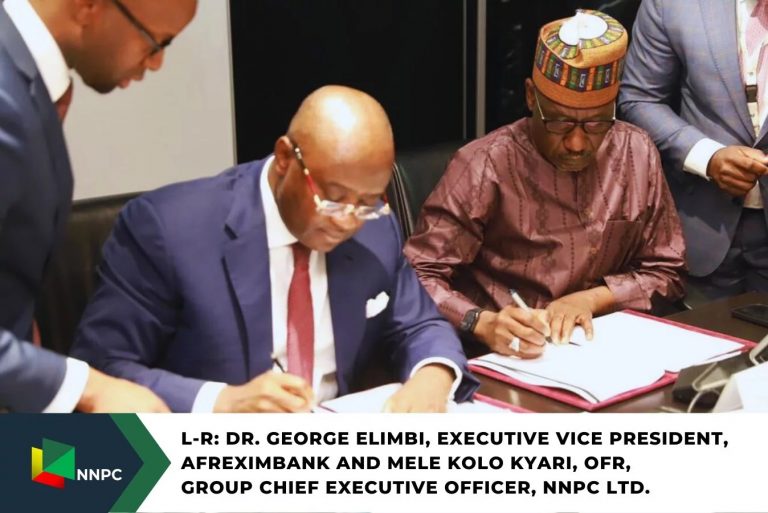
The Nigerian National Petroleum Company Limited (NNPCL) has outlined its comprehensive strategy for deploying the $3.3 billion loan acquired from the African Export-Import Bank.
The announcement made on Sunday, articulated through the document ‘Frequently Asked Questions – Project Gazelle,’ released by Olufemi Soneye, Chief Corporate Communications Officer of NNPCL, sheds light on the ambitious objectives aimed at fortifying operational capabilities, fulfilling tax and royalty obligations, and stabilizing the nation’s foreign exchange market.
The primary objective of the loan, according to the NNPCL, is to meet operational needs, including the upfront payment of tax and royalties to the Nigerian government. In addition, the loan aims to contribute to the stabilization of the foreign exchange market and bolster the country’s foreign reserve.
Register for Tekedia Mini-MBA edition 19 (Feb 9 – May 2, 2026): big discounts for early bird.
Tekedia AI in Business Masterclass opens registrations.
Join Tekedia Capital Syndicate and co-invest in great global startups.
Register for Tekedia AI Lab: From Technical Design to Deployment (next edition begins Jan 24 2026).
“This project provides immediate USD financing for NNPC Limited’s operational needs, including paying its tax and royalty obligations to Nigeria upfront. By using the upfront funding, Nigeria can maintain the stability of its currency, the Naira, and increase its foreign exchange reserves,” the document stated.
To insulate the repayment plan from the volatility of the international oil market, the NNPCL has adopted a conservative crude oil benchmark price of $65 per barrel. The company said that this approach provides a safety margin for potential price fluctuations in the future. However, it acknowledged that higher oil prices would result in a faster repayment of the loan, and vice versa.
In terms of practical implementation, the NNPCL disclosed that it has earmarked 90,000 barrels of crude oil for the payment process, ensuring a steady cash flow. Moreover, the company assured that the loan arrangement would not significantly impact future government earnings from oil sales.
The genesis of this financial maneuver dates back to August when the NNPCL and the African Export-Import Bank (Afreximbank) jointly announced a $3 billion emergency crude repayment loan. This initiative was part of a larger strategy to strengthen the Nigerian Naira, with the loan being repaid against a portion of proceeds from future crude oil production.
By December, the first tranche of the loan, amounting to $2.5 billion, had been received by the federal government, with UBA serving as the arranger.
Energy expert questions the loan deal
However, not everyone is applauding this financial arrangement. Kelvin Emmanuel, an energy expert and financial analyst who serves as the CEO of Dairy Hills, has raised critical questions and expressed concern about the legality and implications of the loan.
Emmanuel has posed four pivotal questions that demand answers: 1. Why is the NNPC as a private company borrowing on behalf of the FGN (their principal shareholder)?
2 Why is the Ministry of Finance Incorporated (MOFI) not leading as the entity warehousing GOEs?
3 Why is NNPC still holding the shares of FGN in Government Owned Enterprises like West African Gas Pipeline Company and NLNG?
4 What happens to the naira equivalent of $3.4bn; Will it be paid into the CRF for use in one budget cycle only?
Emmanuel further scrutinized the loan deal, pointing out discrepancies that he believes could set a dangerous precedent for the economy. He highlighted aspects such as the daily allocation of crude, the total repayment period, the structure of the Special Purpose Vehicle (SPV), and the handling of price differentials between forward sales and spot prices.
In his critique, Emmanuel suggested that the transaction structure could be creating a pseudo-excess crude account, potentially denying Nigeria the benefits of fluctuations in the global oil markets. He expressed disapproval of resource-backed loans and likened the forward sales agreement to the financialization of future oil and gas assets.
“I am NOT a fan of resource-backed loans, and this forward sales agreement that is akin to financialization of future oil and gas assets is an anomaly in statecraft that the National Assembly should fight with all rigor,” Emmanuel remarked. “There is no genius in it; it is a lazy approach to getting FX dollars to improve your balance of payment position.”
He further questioned the need to involve private sector banks as lead arrangers in the syndicate, suggesting that dealing directly with Multilateral Development Banks (MDB) could be a more cost-effective option with lengthier moratorium periods.
In a detailed financial analysis, Emmanuel calculated a differential of $8.8 billion from the total amount, which he classified as fees for facilitation with an MDB, excess for prepayment facility, and credit into a Debt Service Reserve Account (DSRA). He raised a rhetorical question, “How can $8.8 billion be classified as fees for facilitation when you already have a sinking fund in the CRF? Am I missing something?”
He further noted that the revenue generated from a $65 benchmark, considering 90,000 barrels per day over 60 months (1,825 days), amounts to $12.8 billion. Subtracting the actual principal of $3.4 billion and the accrued interest of $591 million over 581 days, the resulting differential is $8.8 billion, representing 258% of the initial loan.
“How can $8.8bn be classified as fees for facilitation with an MDB in Cairo and excess for prepayment facility as well as credit into a DSRA, when you already have a sinking fund in the CRF. Am I missing something?” he queried.
As the controversy surrounding the NNPCL loan continues to unfold, it remains to be seen how the government, financial institutions, and regulatory bodies will respond to the concerns raised by Emmanuel and whether any adjustments will be made to the current financial arrangement.



